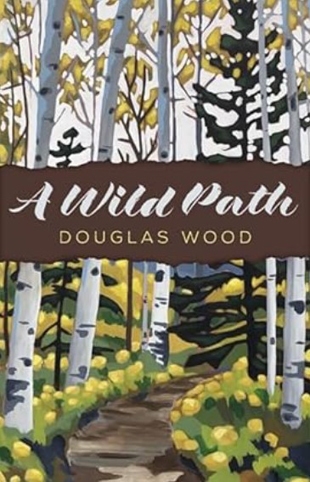Author Douglas Wood is an educator, wilderness guide, and author of many books. Several years ago we wrote a summary article revealing our enthusiasm for him. Frankly, if he had written only Old Turtle (read our review from 1992 here), he would still be one of our favorite spiritual writers of the last thirty-five years.
This new book is a collection of his wilderness essays. Comparisons may be made to the essays (the early ones) of Wendell Berry, except that Douglas Wood’s imagination is perhaps more expansive than Berry’s and certainly more interreligious.
The opening essay, “Nature Boy: A Story of Wilderness Therapy,” is emblematic of the whole. Speaking of himself, Wood summarizes at the beginning: “He learned that through the simplicity of wilderness travel and experience — paddling and portaging a canoe, carving a simple home for the night out of the bush, starting a campfire beneath a sheltering ledge while night winds howled in the pine tops overhead, successfully traversing a windswept lake filled with whitecaps, or shooting a wild rapids — through these experiences and a thousand more he was able to encounter the real world … and there to find his place.”
In the same essay, in the midst of waterfalls in the North Woods — where Douglas Wood lives and thrives — he begins to reflect how Mother Nature heals and gently transforms us. Then, he writes:
“Of course, I was far from the first person to make this discovery. Jesus and Buddha both found themselves by spending time in the wilderness or simply sitting under a tree. Other religious figures, from St. Francis of Assisi to St. Bernard of Clairvaux, spoke of the wisdom and benevolent properties of nature. Shakespeare and poets like Shelley and Bryant, Emerson and Longfellow, wrote of finding 'books in the running brooks, sermons in stones, and good in everything.' In Eastern cultures the connection is at least as strong. Traditional Hinduism, Buddhism, Zen, and Taoism all derive wisdom teachings from the natural world. A favorite Zen saying poses this question: 'Green trees, fragrant grasses: a place not sacred? Where?' And the Buddha imparted perhaps his most famous teaching by silently holding up a single lotus blossom.”
Other essays explore the wisdom of trees, morning gratitude, river trout, Indigenous wisdom, and the need to slow down. The essay, “A Christmas Walk,” offers an expansive view of “a universal Christ, a timeless, cosmic spiritual entity of profound love and acceptance, temporally manifested in the person of Yeshua but always present in all of creation.”
Simple black-and-white drawings grace the pages, which are grace-filled themselves. This is one of our favorite books of this year. (Look for our complete list of the year’s “Best Spiritual Books of 2023” soon.) Douglas Wood teaches us, “Life is short, no matter how long we live. So, we had better live.”
Try a Spiritual Practice to Join Your Story with the Earth's Story
Go Deeper:
Practicing Spirituality in Nature: An E-Course that celebrates the sacred gifts of the natural world.
